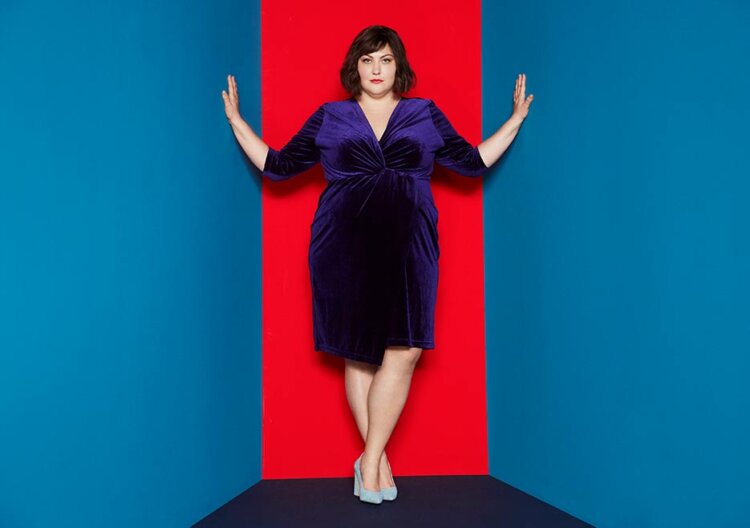
You might have seen Joy Nash on Twin Peaks or The Mindy Project, or you might be one of the 1.8 million people who have caught her viral “Fat Rant” on YouTube 11 years ago, a series that cemented her status as a “fat activist.” But if you’re not already a fan, Dietland–a groundbreaking new show on AMC–will make you one.
As protagonist Alicia “Plum” Kettle, Joy, 37, is affecting, vulnerable and relatable. If the responses on Twitter are any indication (“finally, someone who looks like me on TV”), viewers agree.
Here, we talked to Joy, who hails from Redlands, California, about some of life’s big questions and why she is getting bare for her big break.
- Do you believe in God?
I used to. Now I call myself agnostic–I don’t know what I don’t know. I grew up really religious evangelical, but I moved away from that in college. I’m not a person who likes to stomp on anything, though. I think there are things beyond us. I don’t think it’s my job to turn everyone into a Christian anymore. - What do you believe happens when we die?
I don’t spend a lot of time thinking about that. A lot of people die around me; I hope we’ll see them again. If this life is the end, it’s on us to do as many kind things as we can in this life, it’s the only thing we know for certain. - What were you like in high school?
I had a great time in high school. I had lots of friends (which is probably why college was so much harder). I went to a tiny private school until ninth grade, then to public high school with 3,000 kids. It was a big change, but I was super ready to not have people breathing down my neck so much. I still had the core friends I’d grown up with, including my best friend who convinced me to take my first drama class. It was the first day of 10th grade, and I was planning on taking choir. But my best friend signed up for drama, and told me, “The teacher has long hair and an earring and rides a motorcycle, and when kids fall asleep, he shoots them with a SuperSoaker.” So I signed up for drama. - Dietland brings to life many of the struggles that women (of many sizes) have experienced because of what they look like. In real life, you’re a self-described “fat activist” who’s extremely comfortable with yourself and unapologetic about taking up space in the world. But Plum is profoundly uncomfortable with herself. Did you ever feel like her when you were younger? And if so, when did you find the confidence you have today?
Around the time that I wrote the fat rant–it was an assignment for school–my best friend had a terminal illness, and I was really angry that we were making excuses why we couldn’t live life; when she was so frail, I was refusing to do things because there was something wrong with my body when in fact I could do anything. I still feel it [the discomfort] in certain ways, but I don’t blame it on my size, I blame it on a lot of other things. I was always so nervous and shy. I wanted to be on stage, but I couldn’t bring myself to volunteer. When our class did monologues it wasn’t alphabetical order, so I wouldn’t do it until the end. Afterward, I remember a friend–she wasn’t a friend then, she was someone I found intimidating–saying, “If that’s what you’re sitting on, what the hell are you waiting for? What took you so long?” - What kind of transformative effect do you hope that Dietland–and your involvement in the lead role as a fat activist–will have on women, men and the world?
On a basic level, the mere act of seeing someone who looks like themselves on TV, I hope that helps people. I show as much of me as possible; I’m putting my money where my mouth is by taking off my clothes. I feel like we made the show and it’s out of my hands: it’s not my responsibility what people do with it. But I think that watching someone go on a journey like Plum does–going from self-loathing into an actualized person who has a point of view and is working on helping others and changing things outside of herself–that can be empowering to people. Her focus moves from herself to the world. Whether or not someone wants to do exactly the same thing as she does, watching that journey can help people do something similar.
Be sure to read our interview with Sarai Walker, the author of the book Dietland is based on. Plus, you can check out our past 5 Deep Questions as well.


Grok Nation Comment Policy
We welcome thoughtful, grokky comments—keep your negativity and spam to yourself. Please read our Comment Policy before commenting.